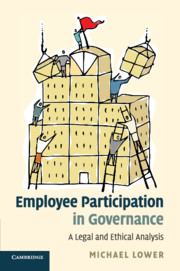Book contents
- Frontmatter
- Contents
- Acknowledgements
- Tables of legal instruments
- 1 Introduction
- 2 Catholic Social Thought: nature, sources and core principles and values
- 3 Catholic Social Thought and work
- 4 Catholic Social Thought, private property and markets
- 5 The corporation
- 6 The firm and society
- 7 Employee participation in corporate governance: an ethical analysis
- 8 Corporate Governance in the United Kingdom
- 9 Labour law and employee participation
- 10 Employee participation and EU corporate governance
- 11 Conclusion
- Bibliography
- Index
2 - Catholic Social Thought: nature, sources and core principles and values
Published online by Cambridge University Press: 05 October 2010
- Frontmatter
- Contents
- Acknowledgements
- Tables of legal instruments
- 1 Introduction
- 2 Catholic Social Thought: nature, sources and core principles and values
- 3 Catholic Social Thought and work
- 4 Catholic Social Thought, private property and markets
- 5 The corporation
- 6 The firm and society
- 7 Employee participation in corporate governance: an ethical analysis
- 8 Corporate Governance in the United Kingdom
- 9 Labour law and employee participation
- 10 Employee participation and EU corporate governance
- 11 Conclusion
- Bibliography
- Index
Summary
Introduction
This chapter introduces CST, its sources, nature and fundamental concepts. It will try to explain how CST works and how it relates to other disciplines. It attempts to persuade the reader that, even though it is a branch of moral theology, CST can be understood and constructively engaged with by everyone. CST's employee participation prescriptions are a logical consequence of the anthropological and ethical framework within which it operates. This chapter tries to give a clear account of that framework.
The central point to grasp about CST is that it is concerned about the well-being of each and every individual; its central theme is human self-fulfilment and, viewed from the perspective of moral theology, this demands a desire for God's friendship and openness to the self-fulfilment of each and every human person. This chapter will have failed if it does not leave behind it a clear understanding that concern for the welfare of the human person (each and every actual person) is CST's driving force and raison d'etre. It will also try to explain the meaning of ‘human self-fulfilment’ and analogous phrases (such as John Finnis' ‘flourishing’). If CST concerns itself with employee participation (or the lack of it) it is especially because of the deep impact that employee participation can have on the development of the humanity of the worker.
- Type
- Chapter
- Information
- Employee Participation in GovernanceA Legal and Ethical Analysis, pp. 17 - 39Publisher: Cambridge University PressPrint publication year: 2010



